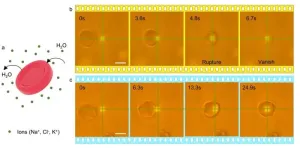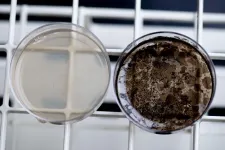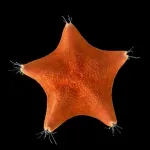(Press-News.org) SAN FRANCISCO —The Public Library of Science (PLOS) is pleased to announce that PLOS Complex Systems and PLOS Mental Health are now open for submissions. Both journals have a strong community of editors who will represent the full diversity of the research communities we aim to serve.
PLOS Mental Health is an inclusive journal led by Editors-in-Chief Charlene Sunkel and Rochelle Burgess, working alongside staff Executive Editor Karli Montague-Cardoso and in collaboration with a diverse Editorial Board. The journal is seeking research that addresses challenges and gaps in the field of mental health research, treatment, and care in ways that put the lived experience of individuals and communities first.
PLOS Complex Systems will bring together leading research of broad significance that facilitates understanding of complex systems in all disciplines, led by Editor-in-Chief Hocine Cherifi in collaboration with our Editorial Board of researchers actively working in the field.
Both journals are intended to bring a broad range of research disciplines and expert perspectives together through broad scopes that facilitate information-sharing among stakeholders. They’re also built on PLOS’ foundation of Open Science principles and will work with research communities to define the practices that improve research integrity, transparency, equity, and visibility in the field.
Both journals are supported by PLOS’ institutional partnership models. PLOS Mental Health will use our Global Equity model which provides regionally equitable opportunities for institutions to cover the cost of Open Access publication on behalf of their authors. PLOS Complex Systems will be supported by our Flat Fee model, which streamlines the process for institutions to reduce or eliminate author fees.
Authors can check our Institutional Partners page to see if their institution is already a partner for either journal. Authors whose institution or funder is based in a Research4Life country are automatically eligible for similar publishing benefits and can view our fees page for eligibility criteria and additional publication fee support options.
Visit PLOS Complex Systems and PLOS Mental Health for more information about the journals and to sign up to receive news and updates, and join the discussion by following the journals on X (formerly known as Twitter) @PLOSMentalHlth and @PLOSComplexSys.
About the Public Library of Science
PLOS is a nonprofit, open access publisher empowering researchers to accelerate progress in science and medicine by leading a transformation in research communication. Since our founding in 2001, PLOS journals have helped break boundaries in research communication to provide more opportunities, choice, and context for researchers and readers. For more information, visit http://www.plos.org.
END
PLOS Complex Systems and PLOS Mental Health now open for submissions!
2023-11-01
ELSE PRESS RELEASES FROM THIS DATE:
The remains of an ancient planet lie deep within Earth
2023-11-01
In the 1980s, geophysicists made a startling discovery: two continent-sized blobs of unusual material were found deep near the center of the Earth, one beneath the African continent and one beneath the Pacific Ocean. Each blob is twice the size of the Moon and likely composed of different proportions of elements than the mantle surrounding it.
Where did these strange blobs—formally known as large low-velocity provinces (LLVPs)—come from? A new study led by Caltech researchers suggests that they are remnants of an ancient planet that violently collided with Earth billions of years ago in the same giant impact that created ...
New twist on optical tweezers
2023-11-01
Optical tweezers manipulate tiny things like cells and nanoparticles using lasers. While they might sound like tractor beams from science fiction, the fact is their development garnered scientists a Nobel Prize in 2018.
Scientists have now used supercomputers to make optical tweezers safer to use on living cells with applications to cancer therapy, environmental monitoring, and more.
“We believe our research is one significant step closer towards the industrialization of optical tweezers in biological applications, specifically in both selective cellular surgery and targeted drug delivery,” ...
Stigma felt by opioid-dependent moms impacts the health care received by their babies
2023-11-01
COLUMBIA, Mo. -- The rate of opioid use among pregnant women in the United States quadrupled between 1999 and 2014 and continues to rise — an alarming trend that researchers from the University of Missouri and University of Iowa say has exposed the stigma felt by opioid-dependent mothers and how their shame has negatively impacted the health care received by their infants.
Jamie Morton led a study, which was a metasynthesis of existing literature on the topic, as a doctoral student at the MU Sinclair School of Nursing. She said the findings can help ensure health care providers, family ...
The ringed seals in Ilulissat Icefjord, Greenland are special
2023-11-01
Exploring Arctic nature can be difficult. Harsh conditions and great distances are significant challenges when researchers want to coax secrets out of nature.
However, a research project, led by Greenlandic and Danish researchers, has now succeeded in describing a new type of ringed seal that lives in the Icefjord near Ilulissat in West Greenland; a unique natural area on the UNESCO World Heritage List.
The results have just been published in the renowned scientific journal Molecular Ecology.
A small population
Over ...
NRL ISS Mission seeks new bioinspired materials
2023-11-01
WASHINGTON – The U.S. Naval Research Laboratory’s Melanized Microbes for Multiple Uses in Space Project, or MELSP, will use the International Space Station (ISS) to search for production of melanin variants and other useful biomaterials that can have applications both on Earth and in space. The mission is scheduled to launch in early November 2023.
Melanin is described as a group of biopolymers responsible for various biological functions, including pigmentation of skin, hair, and iris of the eyes, which helps protect body ...
Pinpointing HIV immune response
2023-11-01
New research combining computer modeling and experiments with macaques shows the body’s immune system helps control human immunodeficiency virus (HIV) infections largely by suppressing viral production in already infected cells while also killing viral infected cells, but only within a narrow time window at the start of a cell’s infection.
“To eliminate HIV, we have to understand how the immune system attempts to control the infection,” said Ruy M. Ribeiro, a theoretical biologist at Los Alamos National Laboratory who led the development of the model ...
First mice engineered to survive COVID-19 like young, healthy humans
2023-11-01
Researchers have genetically engineered the first mice that get a human-like form of COVID-19, according to a study published online November 1 in Nature.
Led by researchers from NYU Grossman School of Medicine, the new work created lab mice with human genetic material for ACE2 – a protein snagged by the pandemic virus so it can attach to human cells as part of the infection. The mice with this genetic change developed symptoms similar to young humans infected with the virus causing COVID-19, instead of dying ...
As people live longer, family caregivers face financial challenges
2023-11-01
PHILADELPHIA (November 1, 2023) – Many people overlook the short- and long-term costs of financial caregiving, a growing problem that financial advisors and employers can help address, according to a new report by the TIAA Institute and the University of Pennsylvania School of Nursing (Penn Nursing).
One in five adults now provide uncompensated care to loved ones with health problems, and the report provides a comprehensive compilation of insights and research that underscores how the caregivers face a ...
Human mini guts reveal new insights into the process leading to Cronkhite-Canada syndrome and potential new therapies
2023-11-01
Researchers at Baylor College of Medicine and collaborating institutions working with human intestinal organoids, also called mini guts, have shed new light on the potential causes of Cronkhite-Canada syndrome, a rare condition characterized by abundant non-cancerous growths or polyps in the intestine and other symptoms such as hair and nail loss and changes in skin pigmentation. Published in The Journal of Clinical Investigation, the study is the first to show a connection between high polyp proliferation and increased levels of serotonin produced by the intestinal epithelium.
The findings suggest a potential new approach to treat this disease with serotonin ...
Long presumed to have no heads at all, sea stars may be nothing but
2023-11-01
For centuries, naturalists have puzzled over what might constitute the head of a sea star, commonly called a “starfish.” When looking at a worm, or a fish, it’s clear which end is the head and which is the tail. But with their five identical arms — any of which can take the lead in propelling sea stars across the seabed — it’s been anybody’s guess how to determine the front end of the organism from the back. This unusual body plan has led many to conclude that sea stars perhaps don’t have a head at all.
But ...





